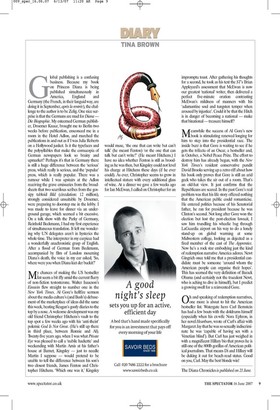TINA BROWN Clobal publishing is a confusing busine
TINA BROWN Clobal publishing is a confusing business. Because my book onPrincess Diana is being published simultaneously in America, England and Germany (the French, in their languid way, are doing it in September, apres la rentree), the challenge to the author is to be Zelig. One nice surprise is that the Germans are mad for Diana — Die Biographie. My esteemed German publisher, Droemer Knaur, brought me to Berlin two weeks before publication, ensconced me in a room in the Hotel Adlon, and marched the publications in and out as if I was Julia Roberts on a Hollywood junket. Is it the typefaces and the polysyllables that make the cornucopia of German newspapers look so brainy and upmarket? Perhaps it's that in Germany there is still a huge difference between the 'serious' press, which really is serious, and the 'popular' press, which is really popular. There was a rumour while I was upstairs at the Adlon receiving the grave emissaries from the broadsheets that two scurrilous scribes from the gossipy tabloid Bild (circulation: 12 million), strongly considered unsuitable by Droemer, were preparing to doorstep me in the lobby. I was made to leave for dinner via an underground garage, which seemed a bit excessive. On a talk show with the Parky of Germany, Reinhold Beckmann, I had my first experience of simultaneous translation. It left me wondering why UN delegates aren't in hysterics the whole time. The interpreter in my earpiece had a wonderfully anachronistic grasp of English. After a flood of German from Beckmann, accompanied by film of London mourning Diana's death, the voice in my ear asked, 'So, where were you when Diana kict der buckit?'
My chances of making the US bestseller list seem a bit iffy amid the current flurry of non-fiction testosterone. Walter Isaacson's Einstein flew straight to number one in the New York Times. Al Gore's hellfire sermon about the media culture's (and Bush's) debasement of the marketplace of ideas did the same this week, beating Reagan's goofy diaries to the top by a nose. A welcome development was my old friend Christopher Hitchens's vault to the top spot a few weeks ago with his 'anti-theist' polemic God Is Not Great. (He's still up there in third place, between Ronnie and Al). Twenty-five years ago, when I was what Private Eye was pleased to call a 'nubile hackette' and weekending with Martin Amis at his father's house at Barnet, Kingsley — just to needle Martin I suppose — would pretend to be unable to tell the difference between his son's two closest friends, James Fenton and Christopher Hitchens. 'Which one was it,' Kingsley would muse, `the one that can write but can't talk' (he meant Fenton) 'or the one that can talk but can't write?' (He meant Hitchens.) I have no idea whether Fenton is still as brooding as he was then, but Kingsley could not level his charge at Hitchens these days (if he ever could). As ever, Christopher seems to grow in intellectual stature with every additional glass of wine. At a dinner we gave a few weeks ago for Ian McEwan, I called on Christopher for an impromptu toast After gathering his thoughts for a second, he took as his text the ST s Brian Appleyard's assessment that McEwan is now our greatest 'national' writer, then delivered a perfect five-minute oration contrasting McEwan's mildness of manners with his 'adamantine soul and tungsten temper when aroused by injustice'. Could it be that the Hitch is in danger of becoming a national — make that binational — treasure himself?
eanwhile the success of Al Gore's new book is stimulating renewed longing for him to step into the presidential race. The inside buzz is that Gore is waiting to see if he gets the trifecta of an Oscar, a bestseller and, in October, a Nobel Peace Prize. The effort to destroy him has already begun, with the New York Times's resident conservative pundit David Brooks serving up a retro riff about how his book only proves that Gore is still an arid geek who takes the air out of a room. That's an old-hat view. It just confirms that the Republicans are scared. In the past Gore's real problem was that his life story offered nothing that the American public could romanticise. He entered politics because of his Senatorial father, he ran for president because he was Clinton's second. Not long after Gore won the election but lost the post-election lawsuit, I saw him trundling his wheelie bag through LaGuardia airport on his way to do a lonely stand-up on global warming at some Midwestern college, looking as dejected as a fired member of the cast of The Apprentice. Now he's a rock star embodying just the kind of redemption narrative America adores. Newt Gingrich once told me that a presidential candidate must be someone 'around whom the American people can organise their hopes'. This has seemed the very definition of Barack Obama (and certainly not the truculent Newt, who is aching to dive in himself), but I predict a growing swell for a reinvented Gore.
h and speaking of redemption narratives, one more is about to hit the American bestseller list. Watergate hero Carl Bernstein has had a few bouts with the doldrums himself (especially when his ex-wife Nora Ephron, in her novel Heartburn, wrote of Carl's affair with Margaret Jay that he was so sexually indiscriminate he was 'capable of having sex with a Venetian blind'). But Carl has just weighed in with a magnificent Hillary bio that proves he is still one of the 8001b gorillas of American political journalism. That means Di and Hillary will be duking it out for beach-read status. Good on you, Carl. May the best blonde win!
The Diana Chronicles is published on 21 June.




















































 Previous page
Previous page